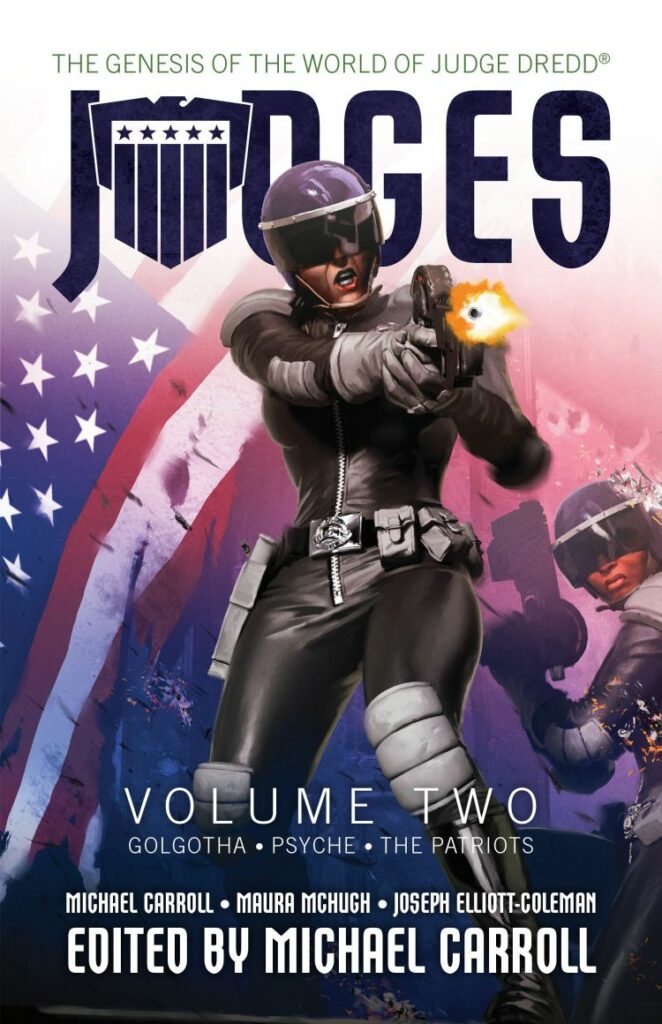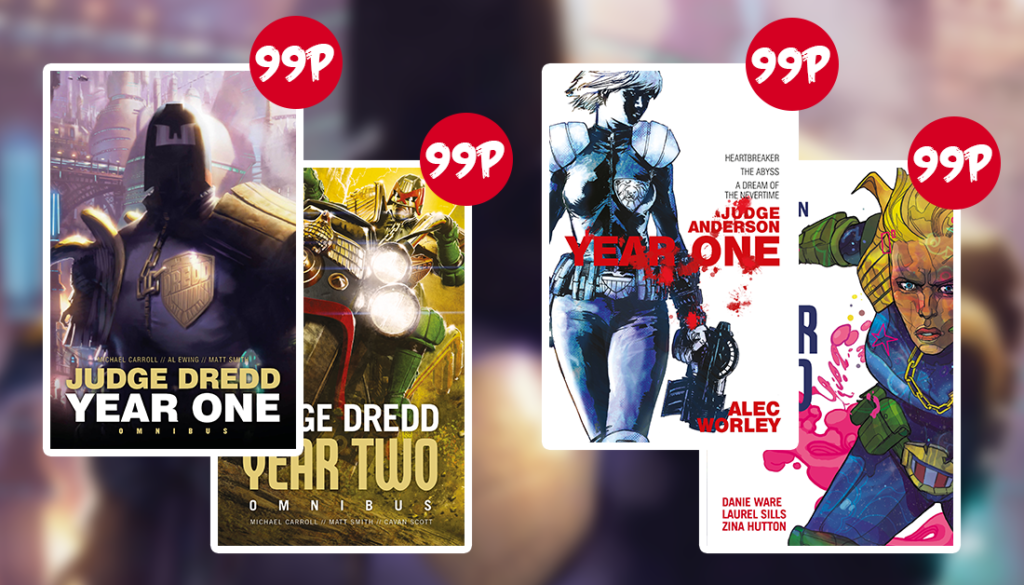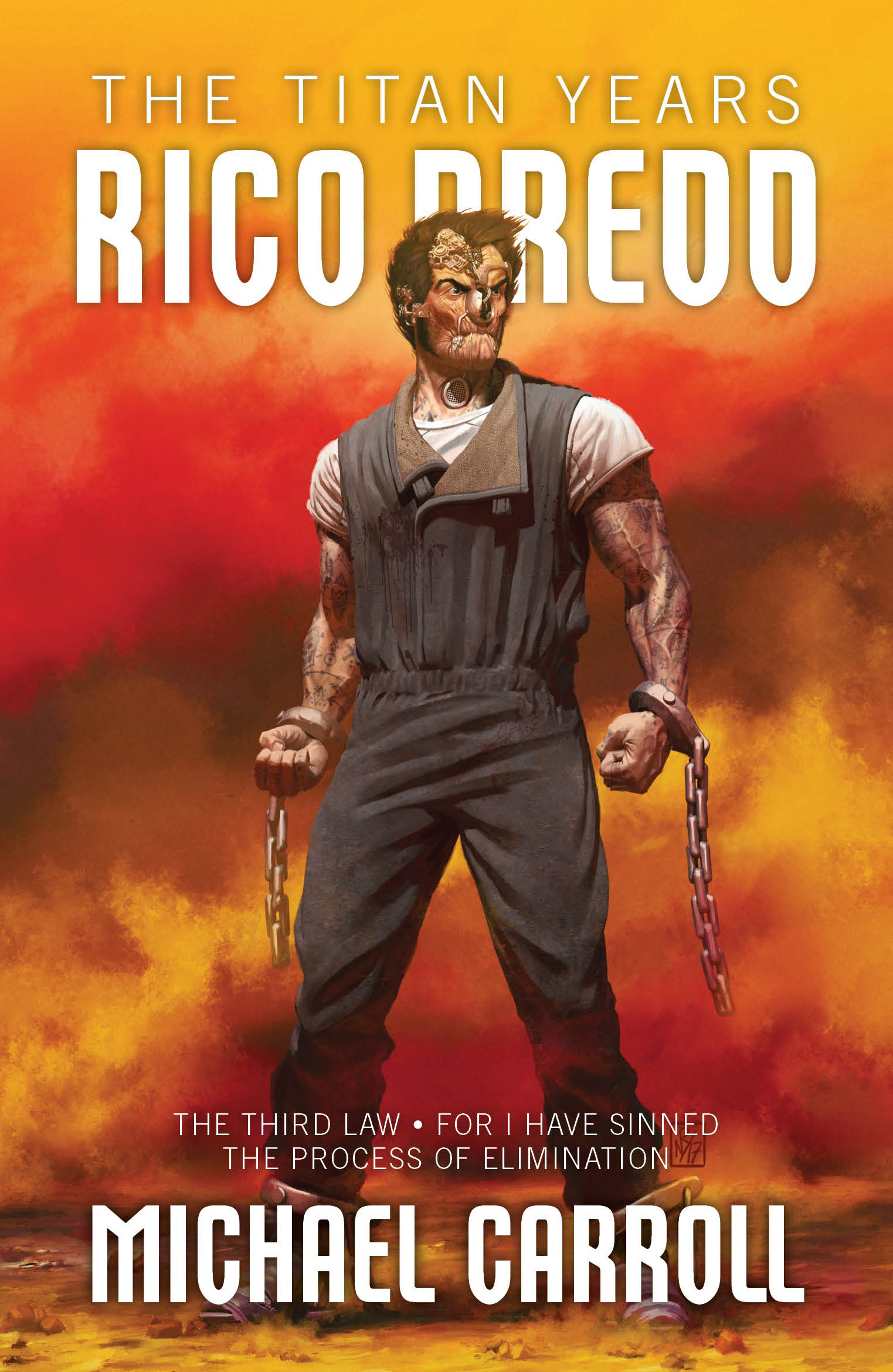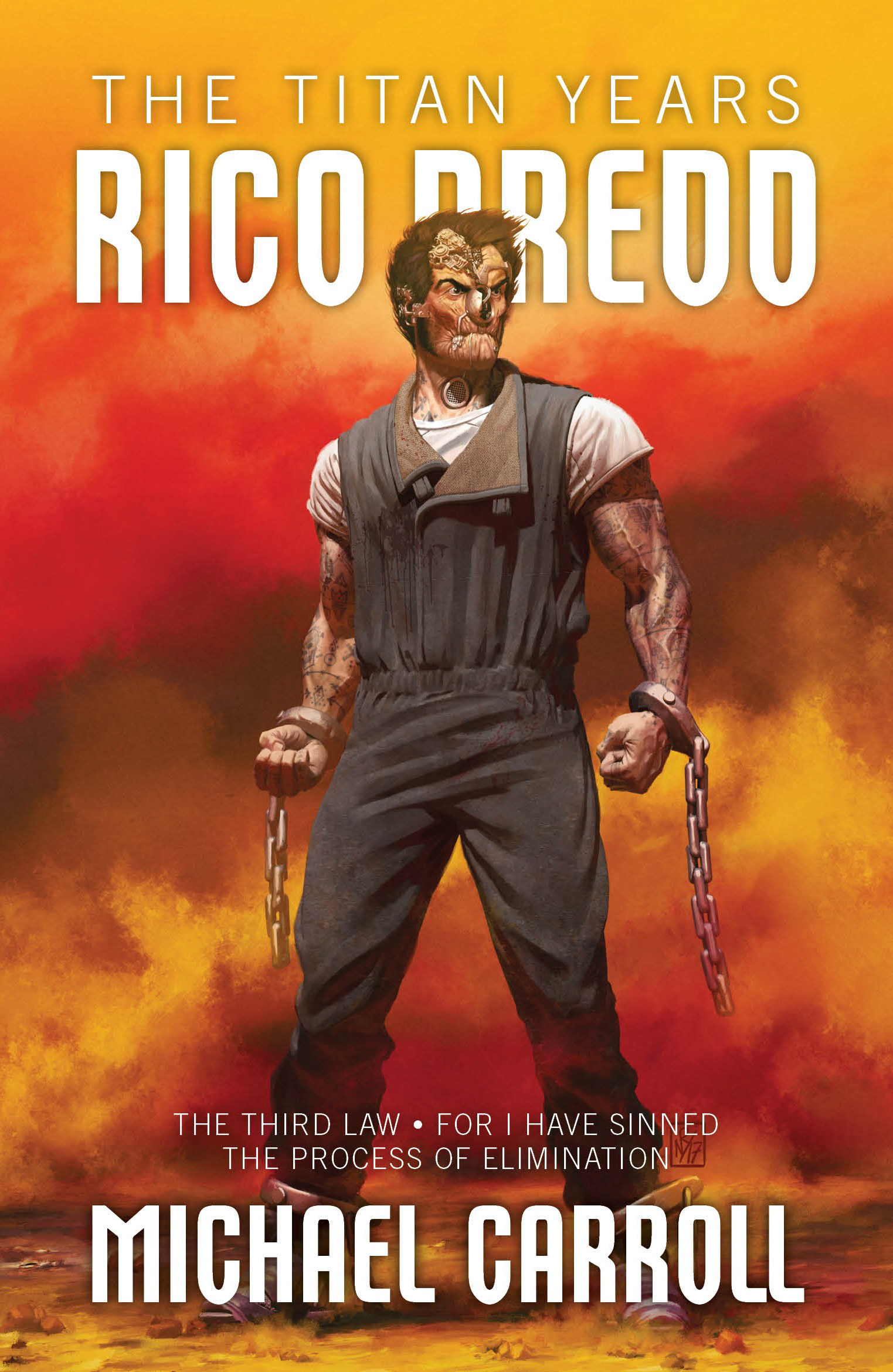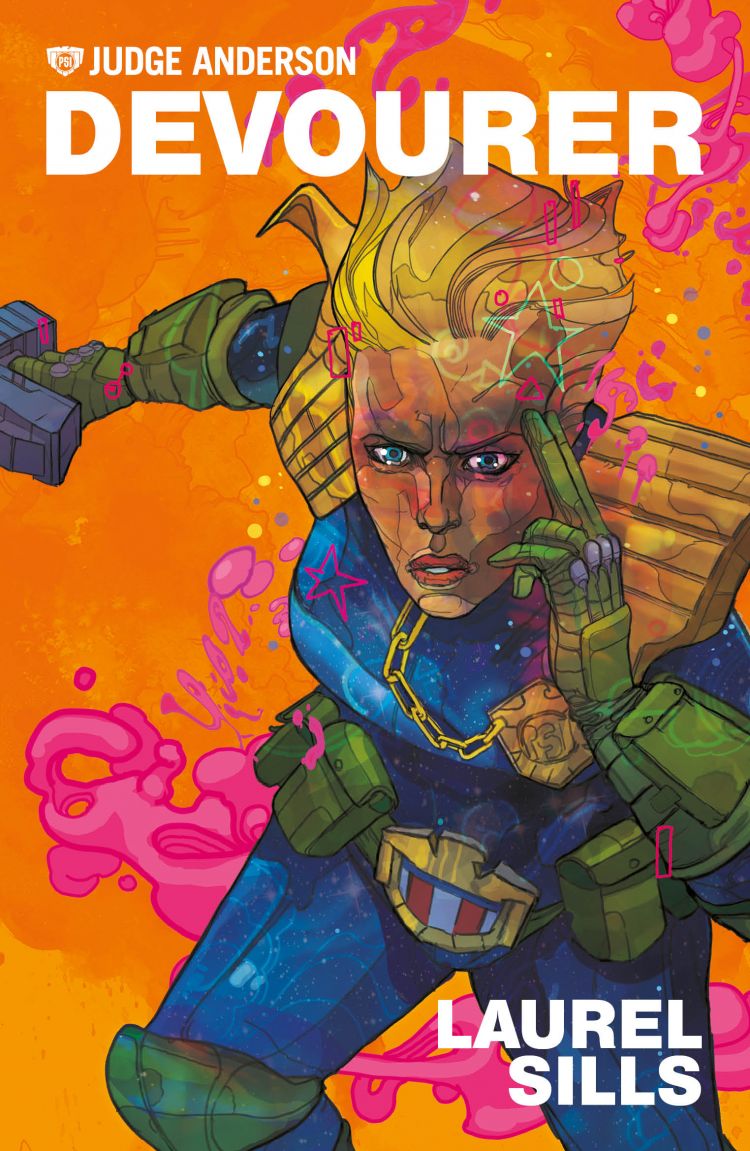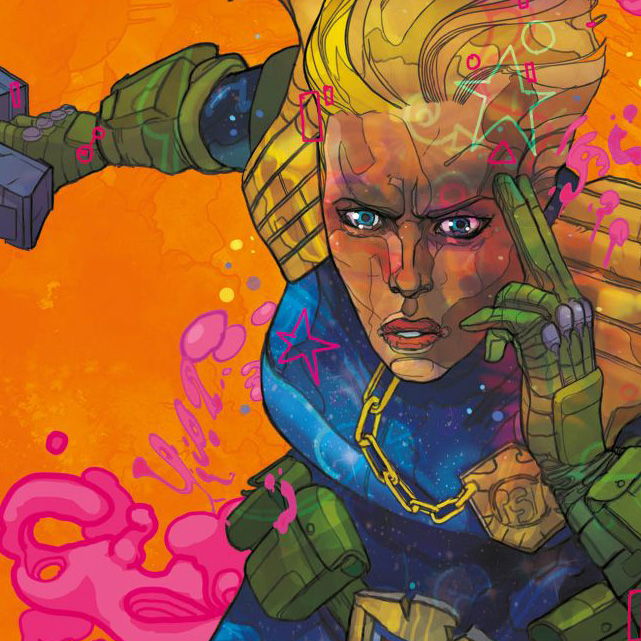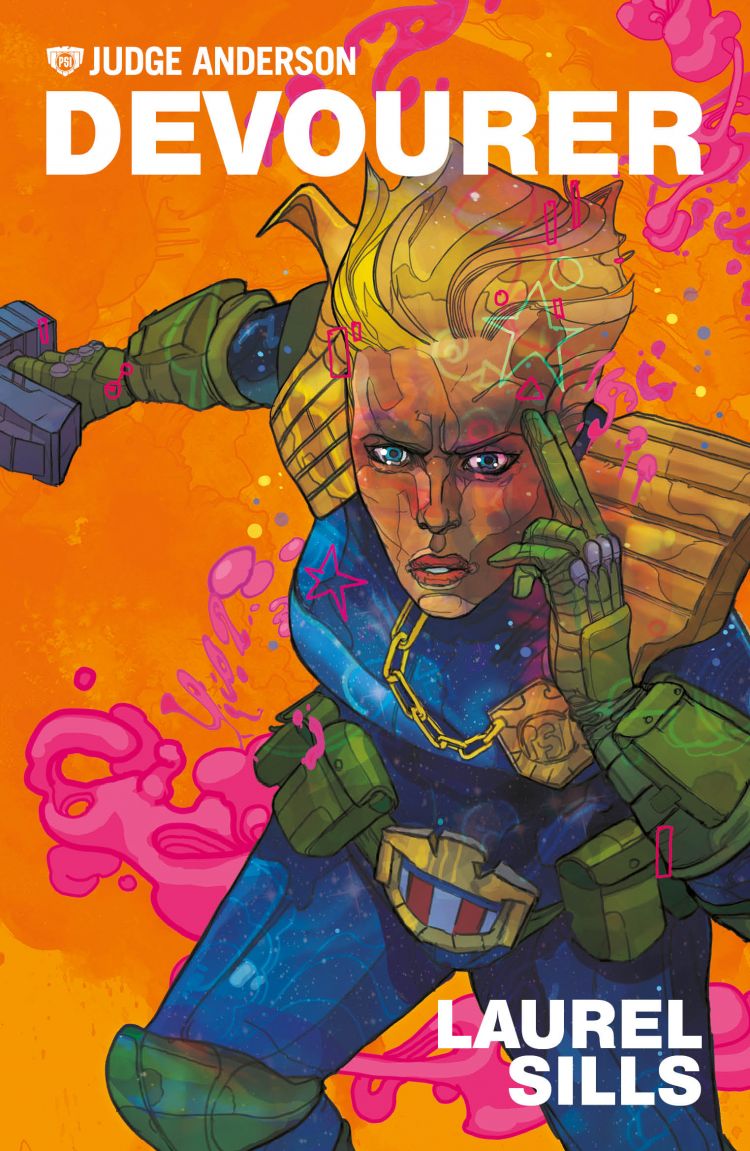
The latest Judge Dredd prose novella is now available to buy in print, ebook, and on Kindle devices – and you can read the first chapter, for free, now!
Judge Dredd – Year Three: Bitter Earth by Laurel Sills is the latest in the Judge Dredd: Year Three novella series, following Judge Dredd as he undertakes his third year on the mean streets of Mega-City One.
It is now 2082 and flying out to the Cursed Earth to babysit Tek-Div nerds working on soil reclamation is hardly Judge Joe Dredd’s idea of useful work, but everyone has to do their bit.
But an explosion goes off when Dredd and his fellow Judges arrive, and then people start disappearing, and it turns out he’s got work to do after all…
BUY LIMITED PRINT EDITION >>
BUY EBOOK >>
BUY FOR KINDLE DEVICE >>
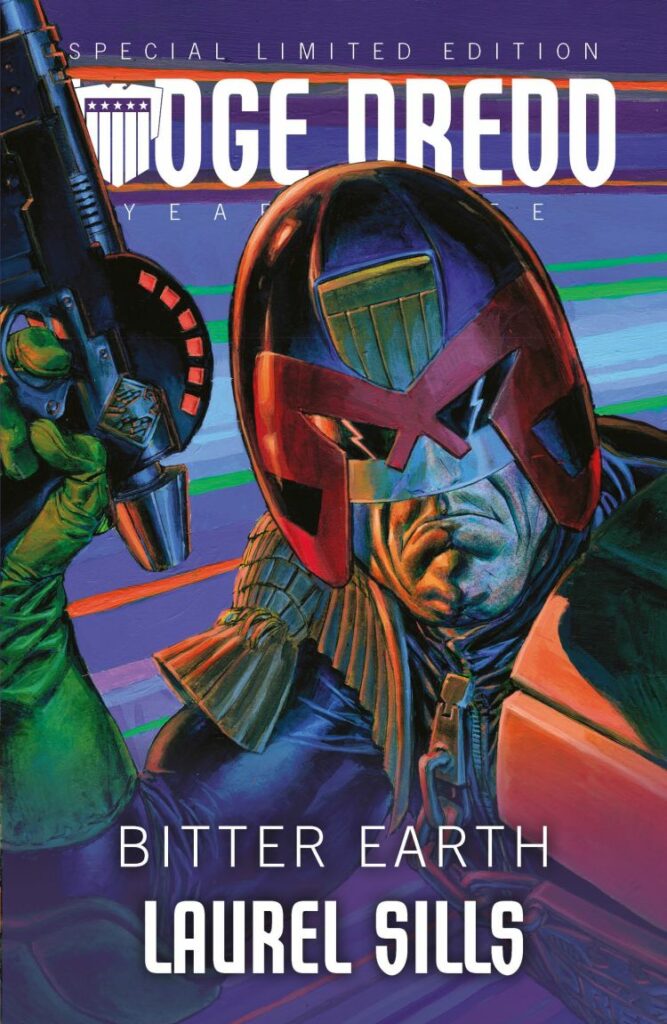
CHAPTER ONE
Dredd clenched and unclenched his fists, shifting against the safety harness holding him in his seat as the Landraider armoured tank grated along the dirt road, leaving MC-1 far behind, now a smudge on the distant horizon.
Soon the Cursed Earth stretched out in an endless haze in all directions, the sheer space of it all doing strange things to his mind. It wasn’t his first—or second—time out here, but it didn’t seem to get easier.
Where were the towering blocks, the teeming traffic, the looping pedways? And that sky! A muted light seeped through the floating rock field that rolled lazily above them, the reason they were in a tank and not an H-Wagon. The sky was supposed to be viewed in small glimpses between the pillars of human invention. It wasn’t supposed to stretch, limitless, exposing all and everything beneath it to any casual glance. The only cover out here was the Landraider itself; no backup maze of backstreets and buildings. He itched to order the outer shields down and cover the wide viewing hatches, but as the youngest Judge on the mission, he kept quiet.
“Don’t like the look of those rocks,” said Judge Deng, strapped to the opposite wall, next to Judge Smee. He pursed his lips.
“There have been no recorded instances of a Judge being killed by a stone falling from a Death Belt,” Judge Smee said, breaking her silence for the first time since they had deployed.
Deng looked a little shocked she had spoken. “How do you know that?” he asked. “There was nothing about that in the mission notes.”
She frowned and looked at him like it was a stupid question. “I read everything the archive had on the Cursed Earth for this mission, didn’t you?”
Deng didn’t answer, and instead went back to scanning the sky through the viewing hatch. Smee leant back in her chair, and resumed staring into space.
Dredd was familiar with Judge Deng, who’d come up in the Academy in the same year as him, but he hadn’t crossed paths with Judge Smee, who’d trained with the other psi-cadets. Judge Deng was clenching his jaw, maybe as displeased as Dredd was that he’d drawn the short straw and been assigned to a babysitting operation, but Smee didn’t seem similarly afflicted. She actually looked relaxed; relieved, almost.
Wearing her straight dark hair cropped just below her ears, she looked as though she had some East Asian heritage. Sometimes, Dredd looked at a person and found himself wondering what it was like for your genes to be a mystery to you. Being a clone of the Father of Justice, he knew exactly where he came from, and whose shoes he needed to fill. He liked the certainty of it, but knew from hard experience that genes meant nothing when it came to personality. His disgraced twin brother Rico was a case in point.
Being a clone of the big guy hadn’t stopped him from being assigned to this backwater mission either. When Chief Judge Goodman had summoned Dredd to his office to tell him he’d been temporarily reassigned to the Cursed Earth, Dredd had to grind his teeth to stop an insubordinate protest escaping.
Goodman must have noticed, as he’d felt the need to explain himself, which was out of character.
“Just until the heat from the Carver killings case cools off,” he’d said, pacing behind his desk. “And lest we forget, there’s still folks in the SJS gunning for you after the unpleasantness with the Santon family.”
Goodman sighed and rested his hands on the back of his chair. “Frankly, son, I just need you out of the picture for a few months.” He smiled reassuringly. “Nice, quiet, boring job out of the city.”
Dredd had ground his teeth some more and kept his objections to himself. The way to keep the heat off would be to take down more criminals and clean up the streets, not slink off to put his feet up for a few months. Reaching up to his harness, he pulled the release and pushed himself out of the seat, grabbing onto a handhold that hung from the ceiling to steady himself. “Going to check on the prisoners,” he said, before making his way to the driving deck.
“Don’t you mean ‘volunteers’?” Smee corrected as he left.
He grunted in response and curled his lip. These were perps grabbing hold of a good deal—too good, in Dredd’s opinion. Medical experimentation in return for a shortened sentence. Injecting a prisoner with drugs didn’t change what they’d done or what they were capable of. He’d assumed the offer would be reserved for low-risk offences, but after scanning the crimes of the dirtbags they had loaded into the tank holding cubes that morning, he was dismayed to see a string of high-violence offences stacked up beside every name.
Dredd nodded to the tank driver as he entered the driver’s compartment. Garrison, a grizzled old Judge with a bitter twist to his mouth, was serving out his twilight years as a glorified chauffeur.
“Hear anything from below?” Dredd asked, standing over the hatch that led to the holding cubes.
“Not a whisper. Hold on,” Garrison pulled down a lever, and the whole tank shook as they began to go up a steep incline. Dredd planted his legs and braced himself against the back wall.
“Not the perps below I’d be worrying about if I were you, but the mutie in the back.” He shook his head.
Dredd frowned at the older Judge’s statement.
“No point lying out loud, son; if you’re thinking it, then so are they. Those things can get straight into your head. No secrets around Psycho Div, I’ll tell you that for nothing.”
“I’m just going to check the volunteers,” Dredd said, itching to escape the conversation.
Garrison let out a bark of laughter. “More like ‘lab rats.’ Tell you what, they sure are going through ’em. Twenty of ’em in this transport. Used to trickle through, no more than five or so every few months. But now—” he whistled.
“Must be more like a hundred of ’em.
Dredd reached down to open the hatch.
“—and I’ll tell you something else. I haven’t driven any ‘volunteers’ back to a life of freedom. Makes you wonder where all of them are getting to.”
Dredd’s boots clanged against the metal steps as he descended into the vibrating darkness, hitting the lights on the way down. Eyes blinked at him through the bars of the travel cubes lining the far wall. One of them started barking and a few of the others took up the game, some hitting the bars and others laughing. All seemed as it should be.
“Judge,” a big perp called from the cube closest to the bottom of the stairs; he hadn’t been one of the ones barking. “I hear that right? We being sent to die out here?”
Drokk. He must have heard what the Judge had said as he opened the hatch. Ignoring him, Dredd began to walk slowly past the cubes, checking none of them were hiding any contraband or weapons.
“That wasn’t part of the deal!” the perp called as he walked away. “Safe, they said it was. Just some last-round drug tests and then we can go live our lives free again.”
Dredd turned to look at him properly. He was older than Dredd, maybe in his thirties, with a cloud of ugly bleached-blond hair, the roots growing dark and long now, and gang tattoos covering his neck and forehead. They marked him for a high-up in the BoJo gang. It had been taken down recently, exposing their seemingly respectable leader for the crooked self-serving scumbag he really was. They’d made mega creds running so called ‘charitable’ MC-1 projects, enslaving the cits they were supposed to be sheltering from vagrancy to work in their factories. Dredd had seen the reports. A full block had been turned into glitzy condos for BoJo’s enforcers, living it up on the suffering of everyday civs. A guy used to that sort of high life wouldn’t stay straight long outside of a cube, whatever it was he’d signed to say otherwise.
“Keep your mouth shut,” Dredd said, his hand moving to his Lawgiver.
“Typical Judge. Let the crazies bark as much as they want, but hear one word of the truth—”
“You want to make the rest of this journey conscious?” Dredd asked, setting his Lawgiver to stun and aiming it at the BoJo scum’s chest. “Either way, you’re gonna shut your mouth. Understand?”
The perp raised his hands and took a step back, miming zipping up his lips.
Dredd nodded and lowered his weapon; he couldn’t have that sort of rumour spreading amongst the other volunteers, true or otherwise. Satisfied the cubes were holding up and feeling like his trip below may have caused more harm than good, he left the volunteers barking in the dark. He strode past the driver before he could get another word in, slid the door into the passenger deck shut behind him, and went to strap himself back into his seat. Judge Smee looked him in the eye as he fastened his belt. While her face remained calm, her dark brown eyes glittered with fury. Dredd found himself breaking eye contact and looking at the floor. What was her problem?
“Right, let’s get this cleared up now,” she said, looking at Deng and then back to Dredd. “I know what a lot of Judges think of Psi-Div, or Psycho Div, as our driver so artfully put it. To be honest, I couldn’t give less of a drokk what you think. I just need to know that while we’re on this assignment, as fellow Judges, you’ll have my back, just as I’m going to have yours.”
So it was true, they did read minds. She’d been listening in on his conversation with the driver just as Garrison had warned.
“It is against protocol—”
“—to read the mind of a fellow Judge,” Smee finished for him. “I am aware of that.”
Dredd frowned. “And yet—”
“We could hear you,” Deng interrupted, before Dredd could get any further. He shrugged, as if to apologise for siding with Judge Smee.
Dredd let out a breath, watching the young Psi-Judge as she folded her arms and glared out the window. Reassuring another Judge that he had their back felt ridiculous. He had his orders, and they were both Judges, even if they were in different divisions. While mutants where illegal in Mega-City One and subject to deportation or death, human psychics—mutant or not—were extended citizenship as long as they served the Justice Department. Some people couldn’t bend their minds around that, but Dredd hadn’t put much thought into it. The Law was the Law, and Psi-Judges were protected by that Law, as well as being trusted to enforce it.
“What the stomm is that?” Smee said, half standing until her belt restrained her.
Dredd turned to look out the viewing hatch behind him as Deng let out a strangled gasp. The distant sand dunes were writhing, the earth shaking as if from a small, localised earthquake.
“Probably just a sink hole,” Dredd said.
“No, not that,” Deng undid his belt and crossed to press his hands against the window.
“Just wait for it,” Smee added, rising to stand beside him.
Dredd kept his eyes trained on the moving ground. Suddenly something shot from the earth, rising maybe twenty feet into the sky, writhing with what looked like hundreds of tentacles. Dredd made out an enormous hinged jaw lined with jagged teeth before it plunged back under the surface, as if into water. The three of them watched in silence until the ground grew still, and the Landraider took them around a high dune that blocked the now still earth from view.
“Was that a—?” Deng stopped mid-sentence, eyes darting to Smee.
“That was my cousin, Morty the Mutie,” Smee said, sitting back down.
The big man let out a laugh, his body visibly relaxing, and Dredd approved of the use of humour to defuse the tension.
“Some sort of large sand creature,” Dredd supplied. “We’ll report it when we arrive at the science station.”
The sky was the dark orange of dusk when the double domes of the station came into view, backed by a low range of hills of twisted rock, as if they had been melted in a great heat and reformed. Dredd didn’t like the look of them; they would provide cover for anyone wanting to get close to the facility without being seen—or wanting to get away from it. Dredd couldn’t see much evidence of the work within. The assignment report said it was a research centre to try and make headway in detoxifying the Cursed Earth. It was a noble venture; if they could claw back pockets of desert, they could cultivate crops, help feed the ever-multiplying mouths of MC-1. But it also seemed unlikely. The desert wasn’t called ‘cursed’ for nothing. And from what they had witnessed on the way over, it was no exaggeration.
The Landraider rumbled into a huge airlock that closed behind them, and was then blasted with cleansing chemicals to remove any toxins picked up in the desert before passing through the second gate and into the compound. Three Judges—Tomyo, Felps and Woodhead, from their badges—waited to greet them as the hatch opened, ready to board the tank for the journey home; Dredd, Smee and Deng would be relieving them. Dredd nodded in greeting. Deng clasped arms familiarly with Tomyo as Dredd jumped out onto the dust-blown earth and felt the heat of the dome-magnified sinking sun. It was stuffy inside the domes. The parking hangar was just big enough for the tank to turn, and for a bay of dune buggies. Dredd wondered what they were for. Science expeditions to get samples? The first dome was mostly taken up by an unremarkable white building, the lower storeys windowless. Opening the holding cubes from the secondary hatch, together they got the volunteers to line up, the six Judges training their Lawgivers on them.
“Cartwright will be along soon, to tell you where to take ’em,” Tomyo told them.
“Cartwright!” Deng said. “She’s a legend. My sister’s in Tek-Div, she says she laid the groundwork for that new Lunar colony they’re talking about. I’m actually looking forward to meeting her.”
It was strange to hear Deng talk about a sibling, although Dredd knew that some Judges still kept up a semblance of a family affiliation. From what Dredd had experienced of family, you were better off without them. Deng looked up as a woman in her sixties with short silver hair emerged from the building, flanked by two people in matching white lab coats, holding data tablets.
“Welcome to the bio lab,” she said to the Judges as her assistants checked off the volunteers. “If you’d kindly follow my assistants to the volunteer holding cubes—” She held her arm towards the door behind her.
And then the courtyard exploded.


